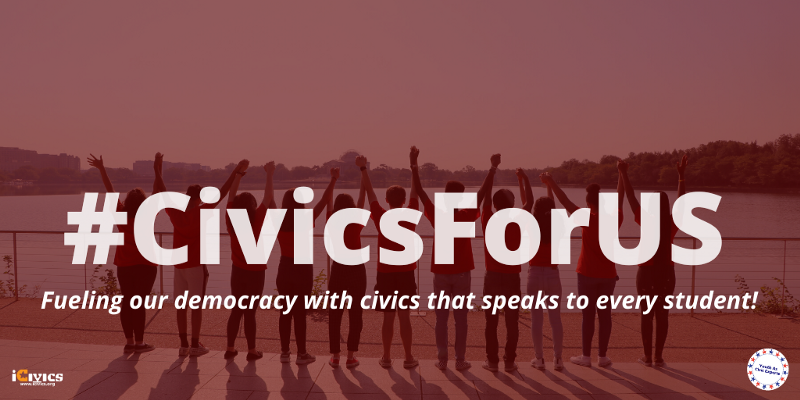
We sat down with Amber Coleman-Mortley, iCivics Director of Social Engagement to discuss the iCivics Equity in Civics Youth Fellowship and her work within the organization to elevate student voice. Visit the #CivicsForUS campaign website, here!
Let’s talk about the youth fellowship. How did it all begin?
The Equity in Civics Youth Fellowship began as part of a collaborative grant between iCivics and Generation Citizen, funded by the William and Flora Hewlett Foundation to explore equity in civic education. Generation Citizen was responsible for working with a Steering Committee of adults to explore this topic; engaging in listening tours and authoring the Equity in Civic Education white paper. iCivics was responsible for centering student voices on our side of the grant. This experience was an opportunity for our organizations to stretch and learn from each other.
Though I have experience building and managing student programs, iCivics did not have a youth program of its own. Last year, iCivics served 6.5 million students in all 50 states, but it was through teachers using our games and lesson plans in the classroom. This opportunity through the grant with the Hewlett Foundation was our chance to directly serve students in an authentic way.
Your students represent major urban centers on the east and west coasts, rural communities, suburban communities, and a cross-section of socioeconomic and racial backgrounds. How do you get students from a variety of backgrounds to bond and work together?
Students forge bonds through collaborative experiences — either virtually or in person. Our fellows learn advocacy and media skills from adult and student experts and then apply that learning to enhance their ability to communicate their experiences.
Students grow bonds through leadership opportunities, too. Our fellows were placed on regional teams with captains shepherding each one. The regional teams worked together to build a national campaign on equity in civic education that centered student voices. Students from nine states and Puerto Rico collected nearly 1000 student responses and opinions on their civic learning. You can read more about that campaign and it’s findings here or watch this video of the top tweets from that effort:
Talk more about the in-person events. COVID-19 has eliminated many possibilities for travel so what did you do differently this year?
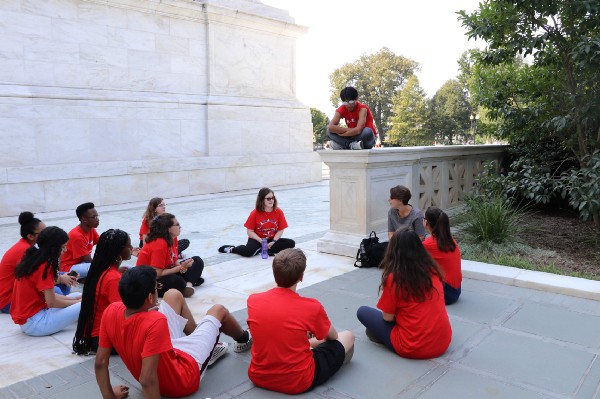 Last year we flew the inaugural cohort of Equity Fellows to Washington, D.C. for a weekend of co-learning and team bonding. Our Executive Director and iCivics staff worked with our students throughout that weekend. Student Voice and Young Invincibles led workshops on social media and advocacy. We also brought in professors and experts — Benjamin Stokes (American University), Joe Rogers, and Eloise Pasachoff (Georgetown Law) to discuss a range of topics from playful civics to the Supreme Court. We had a variety of travel lined up for students for the spring including SXSW EDU and Generation Citizen’s convening to highlight the findings from their grant activities. Unfortunately, these opportunities were halted by the onset of the pandemic.
Last year we flew the inaugural cohort of Equity Fellows to Washington, D.C. for a weekend of co-learning and team bonding. Our Executive Director and iCivics staff worked with our students throughout that weekend. Student Voice and Young Invincibles led workshops on social media and advocacy. We also brought in professors and experts — Benjamin Stokes (American University), Joe Rogers, and Eloise Pasachoff (Georgetown Law) to discuss a range of topics from playful civics to the Supreme Court. We had a variety of travel lined up for students for the spring including SXSW EDU and Generation Citizen’s convening to highlight the findings from their grant activities. Unfortunately, these opportunities were halted by the onset of the pandemic.
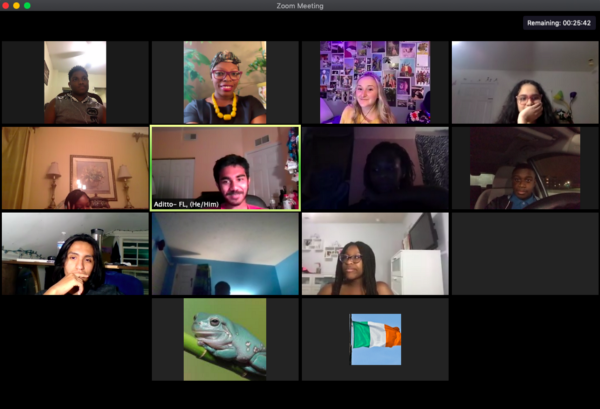 As a result of COVID-19, this year’s Fellows will not be able to travel, but that doesn’t mean they won’t still have powerful learning opportunities. We’ve already held virtual sessions and brought in Education Evangelist Jaime Casap, who blew our kids away. Understanding how COVID-19 has been such a bummer for so many students, the goal this year is to work really hard at preparing these students to speak their truth and find platforms for them to shine.
As a result of COVID-19, this year’s Fellows will not be able to travel, but that doesn’t mean they won’t still have powerful learning opportunities. We’ve already held virtual sessions and brought in Education Evangelist Jaime Casap, who blew our kids away. Understanding how COVID-19 has been such a bummer for so many students, the goal this year is to work really hard at preparing these students to speak their truth and find platforms for them to shine.
You work closely with these students to train them and engage them on important civic topics. What’s your general perspective on student voice?
In a panel with Harvard Graduate School of Education, Educating for Democracy, I said “The role of adults is to facilitate space, serve as a resource hub, connect students with the levers of power — and then get out of the way. We love to feel in control, but we need to allow the process to unfold organically.”
An individual’s civic experience should center their interest and their community needs. As adults, when we elevate student voice, especially the voices of Black, Indigenous, non-black students of color, and rural students, it should never be about our role or what we’ve provided. In fact, no one should even know we were part of a student’s self-actualization process. If we as adults center ourselves in their civic journey — or in their educational journey — we run the risk of being saviors. When we brag about how we’ve pulled students up or given or gifted them experiences, we’re taking away from their agency. Words like empowerment should be used cautiously because an individual is powerful just by the sheer nature of their existence.
What’s the role of adults in elevating student voices?
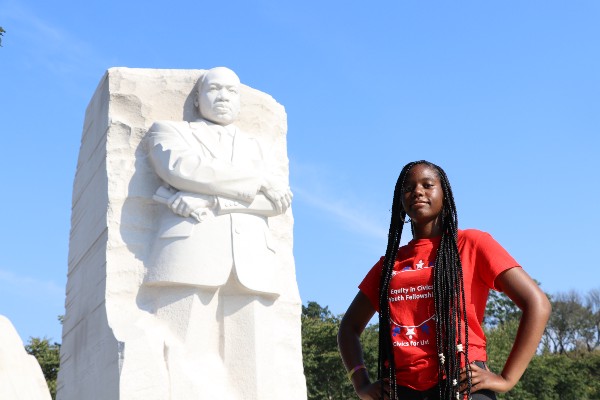 Students are changemakers. Students are thought-leaders. Students are civic enthusiasts and informed voters. Students are not props. It’s not just about throwing a megaphone into a young person’s hands and telling them to “go get it, tiger.” It’s manipulation to believe that we should teach every student to protest or to lobby. It’s also unimaginative to believe that every student wants to have a book tell them about the interworking of how a bill is passed.
Students are changemakers. Students are thought-leaders. Students are civic enthusiasts and informed voters. Students are not props. It’s not just about throwing a megaphone into a young person’s hands and telling them to “go get it, tiger.” It’s manipulation to believe that we should teach every student to protest or to lobby. It’s also unimaginative to believe that every student wants to have a book tell them about the interworking of how a bill is passed.
Our role as adults is to change the civic ecosystems so that when we pump students up to have the courage, the excitement, and the gusto to participate in civic life, they are met with a civic landscape that welcomes them as important and necessary contributors. As it currently stands, many students — especially Black, Indigenous, non-black students of color, and poor students of any race — are faced with harsh opposition when they attempt full participation in their identities and truths. It’s true that students have much to learn, but it should not be about making students wait their turn, especially when they are passionate, right now. We have to fix this. We have to shift this adult mindset.
Access is the biggest gatekeeper when it comes to inequitable outcomes. How do you account for equity when there’s an application-nomination process?
I thought about this a lot during the first year of the program. We had so many qualified applicants and nominations and this year that number tripled. So rather than cut a student from the opportunity, we became more imaginative. We expanded the virtual learning and skill development component and created the Youth As Civic Experts Network. This network houses the paid Equity in Civics Youth Fellowship and also an unpaid opportunity we call the Equity in Civics Youth Amplifiers. Both Fellows and Amplifiers collaborate virtually, engage with our guest speakers, and have access to media training. Amplifiers have fewer deliverables and requirements. You can read more about that in this interview with Kristen Cambell at PACE.
What’s one thing you’ve learned while building and leading this program?
It’s less about what I’ve learned and more about meditating on the right questions. Students have their own ideas about how life can be better, and it is our responsibility to ensure that students have access to the knowledge and resources required for making real changes. I often see adults taking credit for students — taking credit for providing space for students and taking credit for the work that students do. That is the wrong approach.
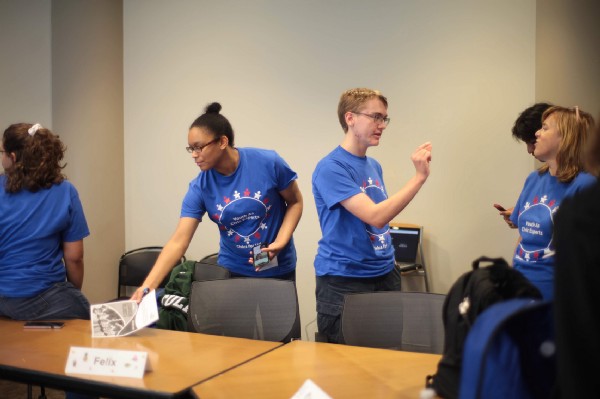 In our program, students are experts in their own lived experiences. The bulk of the program is adults listening to students share their knowledge about their communities, their civic structures, and their learning environments. Yes, we train these students to become ambassadors for equitable civic education for all kids through media training and mentorship; but then we support them in their truth. Our fellows have shared their experiences in national and local media and their success is their own.
In our program, students are experts in their own lived experiences. The bulk of the program is adults listening to students share their knowledge about their communities, their civic structures, and their learning environments. Yes, we train these students to become ambassadors for equitable civic education for all kids through media training and mentorship; but then we support them in their truth. Our fellows have shared their experiences in national and local media and their success is their own.
In a world where nonprofits and programs must prove their impact, how can adult leaders and advocates walk the line of reporting while also not taking credit; participating while not centering adult importance; elevating while not overpowering? These are important questions I’ve learned to wrestle with each day.
Lastly, what makes you excited about this upcoming year?
Let me start by saying that our alumni have taken off. They’ve been on ABC, the Washington Post, on a Reebok Vote campaign, and more. They’ve helped us create our most popular piece of curriculum to date, the Students Power Elections resource. I mean these kids are amazing. I’m excited this year that iCivics is able to continue our work to engage students and elevate their voices and perspectives. It is great that there are so many youth programs out there but it’s just exciting that we also have an opportunity to collaborate with students to build more equitable outcomes for all.
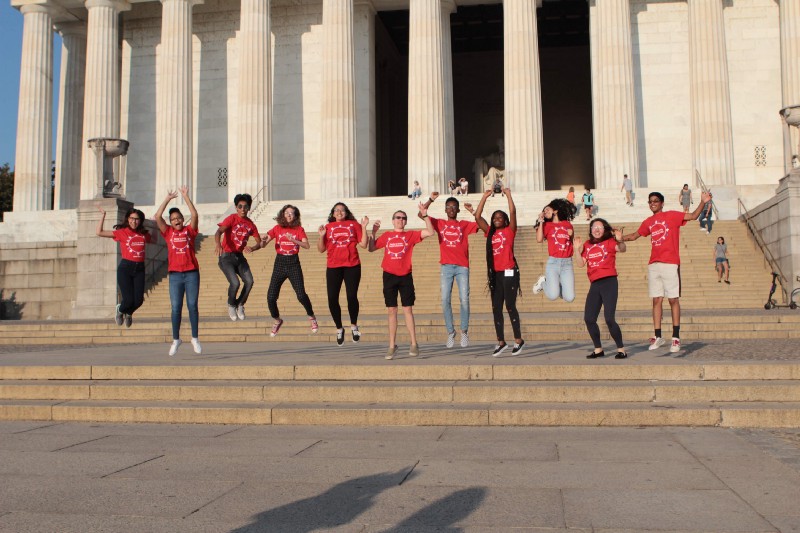
Mark your calendar!
March 8th the #CivicsforUS social media campaign goes live!
June 25–27 Youth As Civic Experts Virtual Showcase


 See All
See All